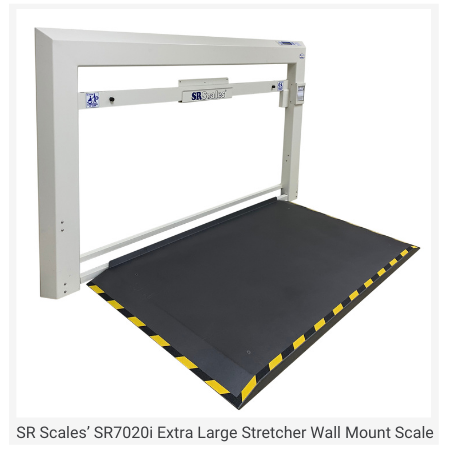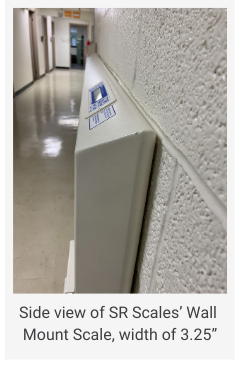25th Jul 2024
Origins of a New Product Design - The Wall Mount Scale
You could say that medical scales in a hospital are, for the most part,
the most ignored piece of diagnostic equipment in a medical center.
Typically, the approach is to buy it once, put it in place where it can
be used as needed, and then pretty much forget about it. Unless of
course, you need something more specialized to help weigh your patients
who are not ambulatory. Then, other scales are needed to fill the gap
for these applications.
Fortunately, there are a wide range of specialized medical scales that
can meet these requirements. This includes chair scales, which are
larger platform scales with a built-in seat or bench that enables
patients who cannot stand, to sit comfortably in the chair to get their
weight taken.
Wheelchair scales
are another popular type of scale where a patient in a wheelchair can
be wheeled onto a large flat weighing surface to have a weight taken.
For semi-ambulatory patients, a chair can be placed on a wheelchair
scale, have its weight tared out, and then a patient can sit in the
chair for weighing.
Also in use for many years are hospital beds that feature built-in
scales that can take a non-ambulatory patient's weight whenever needed.
Just tare out the bedding and mattress weights accordingly.
Additionally, manual operated, hydraulic lift scales with stretcher
attachments have provided an option for weighing non-ambulatory
patients.
Lastly, large built-in floor scales are popular for weighing patients on
stretchers as well. When constructing new hospitals and medical
facilities, these scales can be incorporated into the design; typically
on the first floor when building new facilities.
For existing medical buildings, adding a large built-in scale for
weighing patients on stretchers can be cost prohibitive; that's where
wall mount scales come in handy.
Innovation for a Missing Product and Application

About fifteen years ago, a new type of innovative, large platform
weighing system was introduced to the medical community. The first few
models were designed and engineered for weighing wheelchairs and
stretchers.
The large weighing surface platforms are held in an upright (vertical)
position when not in use. For example, SR Scales' wall mount systems
take up less than four inches of space when the platforms are raised and
stored in their upright positions. The scale's frame is connected to
the weighing platform at the lower, floor-based edge. When lowered, the
platform pivots to the ground and is automatically activated, ready to
take a weight. In order to make the platforms safe when being lowered
(and raised), counter-balancing actuators in the platform enable a
single person to easily lower and raise the unit.
These scales go by a number of names depending upon the brand and
manufacturer, but are commonly referred to as 'wall mount' scales.
The typical weighing practice is to take a patient's weight, whether in a
wheelchair or on a stretcher, and then tare out the weight of the
device (wheelchair or stretcher) to arrive at the weight of just the
patient. Alternatively, if a single device, such as a wheelchair, is
going to be used repeatedly to weigh individual patients, such as in a
long-term care center, you can weigh the wheelchair by itself on the
wall mount scale, then zero out the wheelchair so the display reads '0.0
lbs.' You can then remove the  wheelchair
and have residents (patients) sit in the wheelchair, wheel them onto
the platform to take their weights without having to tare out the
wheelchair's weight every time. After taking all the patients' weights,
the platform can be easily raised back into place against the wall.
wheelchair
and have residents (patients) sit in the wheelchair, wheel them onto
the platform to take their weights without having to tare out the
wheelchair's weight every time. After taking all the patients' weights,
the platform can be easily raised back into place against the wall.
Larger wall mount scales
for weighing patients on stretchers provide hospitals with an
attractive and functional alternative to bulky sling or lift scales. The
wall mount scale's narrow frame provides an ideal space-saving design
for hospitals to store the scales when not in use. For example, SR
Scales' extra-large hospital stretcher scale, the SR7020i, takes up less
than four inches of wall space when not in use. Yet when folded down to
take a weight, the scale's large 38' x 58' platform can accommodate
hospital stretchers with a weight capacity of 1,000 pounds.
Continuous advances in wall mount scale technology provide improved
features to meet the growing demand for this important category of
scales. Check back with your scale provider of choice to learn more
about wall mount scales.
